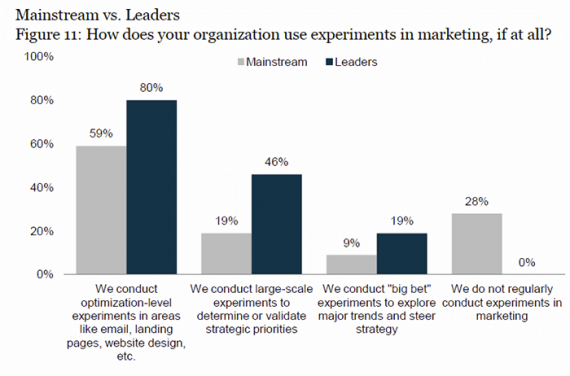As shopping behaviors change, ecommerce marketers should change how they reach new prospects, deepen relationships with customers, and measure results. It may be helpful to make a distinction between marketing experiments — or what we might call strategic marketing experiments — and marketing optimization. Strategic Experiments vs. Optimization There is a sense in which every marketer should always seek to optimize campaigns. For the vast majority of that time, this retail business relied on circulars to help drive sales. Thus the retailer looked at customer behavior and took some guesses about how to market to these shoppers. They are significantly more likely than the norm to conduct all types of experiments, but the divide is widest when it comes to strategic experimentation,” according to the Google and Econsultancy report. The first, published on October 1, 2010, has a marketer in Dilbert’s company admitting that what he does is “mostly guessing.” About three weeks later on October 20, Adams published a second strip about marketing. In it, a sales guy comes to Dilbert to ask if he can become an engineer. Next, ask yourself what needs to happen for you to reach your goal. These guesses should fuel your research and eventually lead you to some strategic experiments.
As shopping behaviors change, ecommerce marketers should change how they reach new prospects, deepen relationships with customers, and measure results. For at least some online retail businesses, this means experimenting with different marketing campaigns and activities at a strategic level and making good guesses about what might work.
It may be helpful to make a distinction between marketing experiments — or what we might call strategic marketing experiments — and marketing optimization.
Strategic Experiments vs. Optimization
There is a sense in which every marketer should always seek to optimize campaigns. Even established and successful promotional campaigns and tactics can be improved through A/B testing, research, data analysis, and subtle changes that produce better results.
Marketers presumably want each promotion to be as effective as possible, and every sort of retail business — from a sole proprietorship to a billion-dollar omnichannel chain — should optimize.
But businesses should also experiment — not to determine which AdWords headline boosted click-through rates, but to make significant shifts in how, where, and when a company markets.
Take the case of a brick-and-click retail business in the United States that has been in operation for more than 50 years. For the vast majority of that time, this retail business relied on circulars to help drive sales. A few years ago, these printed flyers accounted for the lion’s share of the company’s overall marketing investment both in terms of dollars spent and effort.
This retail business worked hard to optimize these circulars, paying close attention to product selection and offers, layout and format, and distribution. But shopper behavior changed. Fewer consumers subscribe to newspapers. The store’s customers increasingly rely on mobile devices for news and information. And these shoppers glide from mobile shopping to desktop shopping to in-store shopping and back again with ease and rapidity.
The heavily optimized circulars slid to a return-on-advertising-spend of just about a dollar in profit for every dollar invested. Thus the retailer looked at customer behavior and took some guesses about how to market to these shoppers.
While some strategic marketing experiments were failures,…

COMMENTS